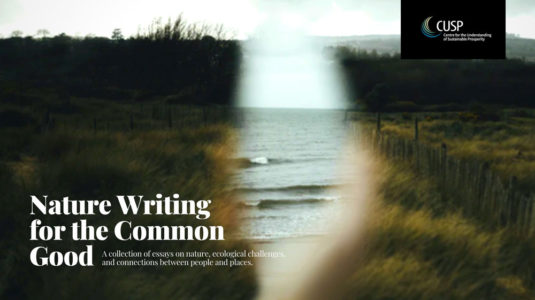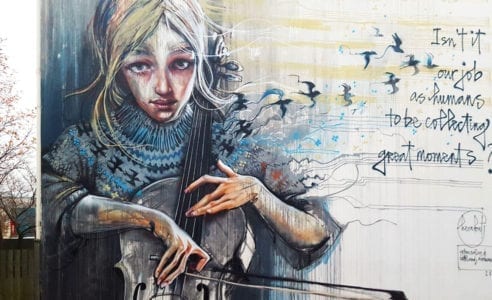Green Stories Writing Competitions: How writers are imagining a greener future
Research by Dr Denise Baden shows that solution based stories, or stories that smuggle in green ideas/characters in the context of an otherwise mainstream story are more likely to inspire greener behaviours than catastrophic tales of climate change. In her guest blog, she summarises some of her findings, and is putting them into the context of the first output of a green stories writing competition she led last year.

A year ago I wrote an article for CUSP on how positive stories that present visions of what a sustainable society might look like are needed to help inspire behaviour change and greener policies. Since then, I followed on from previous research into positive role models in education and positive vs negatively framed news stories to investigate responses to fictional stories about sustainability or climate change.
Research Findings
Readers (n=91) were exposed to two short stories that had a catastrophic focus, one set in the near future about a woman caught in a flood caused by climate change, and a dark dystopia set in a world we had destroyed. Readers were also exposed to two short stories that were more positive—one described a boy inspired by David Attenborough’s Blue Planet series to collect plastic, and one seemed to describe an eco-warrior, but the delightful twist was that the bomb she was planting was a seed bomb that would populate an industrial waste ground with flowers. Readers were asked to reflect and report on how these stories made them feel after each one and then to specifically reflect on which types of stories motivated them to adopt greener behaviours.
The results clearly showed that the positive stories which showed easily relatable people taking positive action were much more likely to give rise to intentions to adopt greener behaviours. Typical responses to the positive stories incorporated themes of feeling empowered to make a difference, having seen specific examples of what they can do, feeling more hope and also positive mood, for example:
It made me want to help. It made me feel happy as it shows everyone can make a difference.
I thought this story was inspirational, made me want to do the same!
In contrast, the majority of readers reported that the catastrophic stories put them off. Common themes were switching off due to avoiding anxiety and fear, or a feeling of being preached at or manipulated, or in many cases, a sense of passive fatalism. Typical quotes were:
It made me feel bleak, a bit hopeless, it’s very dark. Didn’t leave me with good feelings or particularly inspired to change or do things differently. Just depressed!
Implications
These results are important as they counter the commonly held assumption that people need to be scared into action. However, they accord with what would be predicted by psychological theories of behaviour, such as Ajzen’s Theory of Planned Behaviour. The process seems to be that, whereas both positive and negative stories about climate change can increase knowledge and awareness and a sense that something ought to be done, negative stories can reduce efficacy—i.e. the belief one can make a difference, which in turn reduces the likelihood of taking action. Negative/catastrophic stories can also induce emotions such as fear, anger or guilt which can lead to avoidance and a reduced likelihood of taking action. Solution-focussed stories, on the other hand, increase efficacy – a sense that one’s actions will make a difference and thus are more likely to lead to positive action. Also positive emotions are associated with greater action tendencies as predicted by Frederickson’s broaden and build theory of positive emotions.
Short Story competitions
Concerned that the majority of our cultural offerings set in the future are dystopian, and that current portrayals of green characters in mainstream fiction tend to be negative, I collaborated with our Creative Writing School to set up a short story competition. We asked writers to check out potentially transformative solutions on our website greenstories.org.u and integrate them into their story. The kinds of sustainability solutions included are transformative ideas such as the Sharing Economy, the well-being index, The Carbon Credit Card, sustainable food, energy, transport etc. (see greenstories.org.uk/story-ideasresources). Each idea comes with suggestions on how it can be integrated into the backdrop of a story or as the main focus. For example a rom-com, could be set in a society that replaces ownership with borrowing and the heroine goes to a clothes library to borrow a dress for her big date; or the hero in a crime drama could live in a city where everyone has gardens on their roofs, uses the latest green technologies, eats insect burgers and generates energy from their own waste, and so on. The short story competition last year was very successful and out of around 200 entries, 50 were excellent quality.
Book launch for ‘Resurrection Trust’
The top 20 short stories have now been published in an anthology which is now available to buy ‘Resurrection Trust’ – a collection of funny, dark, mad, bad, upbeat, downbeat and fantastical short stories about living sustainably. From eco communities to singing buildings, and sharing economies, these stories showcase a myriad of different ideas about how humans can live more harmoniously with nature, and each other. It has a foreword by Caroline Lucas and review by Jonathan Porritt.
‘Resurrection Trust’ is available from Amazon, or even better hive.co.uk which allows you support your local bookshop and cut price copies are available at the book launch which takes place at October Books, Southampton, SO17 2NF on 28th March at 7.30pm. All are welcome—wine, nibbles, short readings, and mingling. Teachers, students and writers may find ‘Resurrection Trust’ a useful source of ideas if they plan on entering any of our future competitions. We would love to see CUSP readers at the book launch and also would welcome suggestions of other potential sponsors and judges for the prizes.
Upcoming writing competitions
Based on the success of the short stories competitions, we are running further competitions across seven formats. All of our green stories writing competitions are free to enter, have £750 worth of prizes with student categories. Also we have routes to production for the screenplay, stage play, TV, radio and screenplay formats with BBC Writers room and production companies set up to read the top entries and a literary agent from Curtis Brown agreeing to read the top entries in the novel competitions.
Upcoming closing dates are as follows
- Stage Play: deadline June 30th 2019
- Radio Play/comedy series: deadline 12th July 2019 (first prize of £500 sponsored by British Academy of Management)
- Screenplay: deadline Sept 2019 tbc
- Short film: deadline Oct 2019 tbc
- TV/Netflix series: deadline Nov 2019 tbc
- Interactive Fiction: deadline Dec 2019 (first prize of £500 sponsored by Principles of Responsible Management Education, UK and Ireland chapter)
For details see greenstories.org.uk/about-the-competition
We would love to see CUSP readers at the book launch and also would welcome suggestions of other potential sponsors and judges for the prizes.



